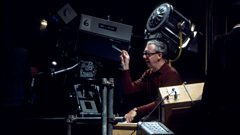Phoenix Rising: The Story of Coventry Cathedral
Giles Fraser examines the history, ministry and artistic legacy of Coventry cathedral as it celebrates its golden jubilee.
Giles Fraser examines the history, ministry and artistic legacy of Coventry Cathedral as it celebrates its Golden Jubilee.
The Medieval Cathedral church of St Michael was destroyed during a bombing raid by the Luftwaffe during the night of November 14th 1940. It was the first time that a city had been deliberately targeted and totally destroyed in this way and it brought a new word into the English language - from then on, any city that was completely flattened by a bombing raid would be "Coventrated". This event was to change the course of World War 2.
From the moment The Rev Arthur Wales stood amongst the rubble in 1940 and formed three giant 14th Century iron nails into a cross, Coventry Cathedral became an international symbol of reconciliation.
Right from the beginning there was controversy. Plans were made straight away to rebuild the cathedral, but the appointed architect - Giles Gilbert Scott - resigned over criticism of his design, and it was thrown open to competition. Many thought Basil Spence's winning design was too modern, irrelevant and an expensive white elephant. There was a raging battle with the local council about obtaining a license to build which went on for years before plans could go ahead.
The new cathedral was designed to encompass its worldwide message of peace and consecrated 50 years ago on 25th May 1962. Like the city itself rising phoenix-like from the ashes, it represented new hope, pulling together the foremost British architects, artists, sculptors, craftsmen, musicians and performers of the day, effectively creating a cultural snapshot of 60s Britain. These included the architect Basil Spence, John Hutton, Jacob Epstein, Graham Sutherland, John Piper and Elizabeth Frink, to name but a few.
In spite of the difficulties, the feverish excitement when the new cathedral opened was felt throughout Coventry and the Midlands. The message of peace and reconciliation chimed in with the mood of the 60s and there were long queues of long-haired, mini-skirted visitors winding through the surrounding cobbled streets, desperate to witness for themselves such an overtly modern creation.
A three-week festival took place to celebrate the consecration which included drama, sport, pageantry, poetry and exhibitions. Coventry became a cauldron of culture not seen in the UK since the Festival of Britain.
The most famous musical legacy from the cathedral's consecration is Britten's War Requiem, now a recognised modern masterpiece, but other well known composers also wrote commemorative works including Arthur Bliss, Herbert Howells, William Walton and Duke Ellington. Michael Tippett's "King Priam" was premiered the night before the War Requiem.
In modern times the Cathedral has built a reputation for being at the forefront of international reconciliation through its links with other war-damaged cities and its spiritual message of peace, with a particularly strong link to Dresden in Germany.
Giles Fraser is a former canon of St Paul's - another cathedral that burned down and was rebuilt four centuries ago. He is expertly placed, therefore, to discover the story of Coventry Cathedral and find out how relevant such a building and ministry is in today's troubled world. Contributors include the opera conductor and former Coventry Cathedral chorister Paul Daniel, former Cathedral organist Robert Weddle, glass maker Patrick Reyntiens, Louise Campbell - Reader in History of Art at Warwick University, the musicologist Michael Foster who has just published a book about the War Requiem, Anthony Blee - son-in-law and colleague of Sir Basil Spence, members of the current Cathedral clergy and members of the Frauenkirche in Dresden.
Producer - Helen Garrison
(former Coventry Cathedral tour guide).
Last on
Clip
-
![]()
The composition and legacy of The War Requiem
Duration: 02:24
Broadcast
- Sun 27 May 2012 19:45�鶹������ҳ��� Radio 3
What was really wrong with Beethoven?
Classical music in a strongman's Russia – has anything changed since Stalin's day?
What composer Gabriel Prokofiev and I found in Putin's Moscow...
Six Secret Smuggled Books
Six classic works of literature we wouldn't have read if they hadn't been smuggled...
Grid
Seven images inspired by the grid
World Music collector, Sir David Attenborough
The field recordings Attenborough of music performances around the world.




